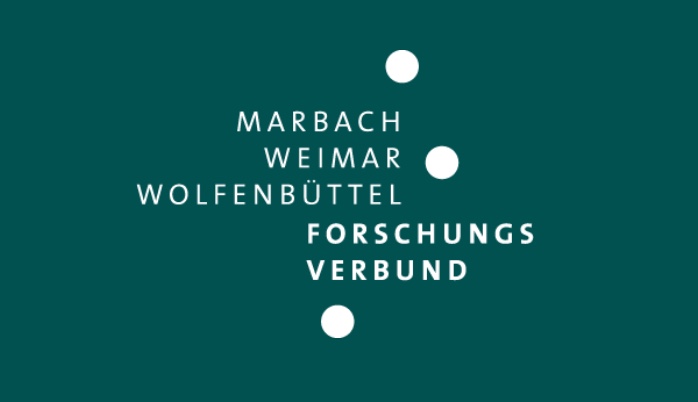
The DLA Marbach (German Literature Archive Marbach), the Klassik Stiftung Weimar and the Herzog August Bibliothek Wolfenbüttel are home to over 500 years of German and European cultural history. In 2013, these institutions joined forces to form the MWW Research Association, which is funded by the German Federal Ministry of Education and Research. From the start, the MWW has been involved in digital collection research and since 2019, there has been a focus on the targeted development of needs-oriented digital services and model solutions.
Abstract submission deadline: 15 Sep 2022
After ten years of successful cooperation, in February 2024, the association will conclude its second phase of funding. The MWW will use this milestone as an opportunity to look to the future together and also to reflect on the significance of digitalisation for cataloguing, researching and presenting culturally and historically important objects, and their contextualisation in collections.
Cultural institutions, museums, libraries and archives have the task of permanently preserving their holdings and cataloguing them in line with contemporary standards in order to expand and deepen our understanding of these historical archives and physical and digital collections, and to share these collections and the knowledge gained from them with diverse audiences. Digital methods, tools and applications play an increasingly important role in this process, especially as cultural institutions are currently undergoing a rapid process of digital transformation, which has recently been accelerated by the Corona pandemic. Against this backdrop, the conference Is Digital Better? Collection Research in the Digital Age aims to stimulate interdisciplinary dialogue about the aims, effects, possibilities and limitations of the digital research on and display of such collections. Submissions should be related to one or both of the following themes:
Reflections
• How has digital collection research developed over the last ten years? Which changes have fundamentally transformed the field? For example, how has it been influenced by the recommendations of the German Council for Scientific Information Infrastructures (RfII) on a national level? And how has digital collection research been impacted by the work of the Resource Description and Access Steering Committee (RSC) on an international level? Which trends have not caught on and why?
• How can digitalisation support and expand the quest for knowledge, or even inspire new ways of thinking and yield results that go beyond the capacities of conventional approaches, for example, by visualising different chronological periods, analysing vast amounts of data, digitally bringing together collections that are geographically separate, or opening up collections to which there is limited or no access?
• Born-digital estates have already become part of archives and the collection of digital data is now a reality for cultural institutions. What kind of practical issues emerge in this context, for example, in terms of storage space, long-term storage space or dealing with born-digital estates?
• How do digital tools and applications actually work? How are virtual exhibitions or virtual and augmented reality opportunities perceived by the research community and the general public?
• What are the limitations of digital methods and approaches? In what ways can they not replace traditional hermeneutic approaches in the analogue world? How can we address the coexistence of traditional and digital methods?
• What potential and limitations do commercial digital programmes and infrastructures present for institutions to research and present their cultural history collections?
• What are the current challenges in digital collections research? What problems have not yet been solved?
Future Visions
• What novel, experimental approaches and visions have emerged for the future of digital collection research?
• How can desiderata be resolved? How do researchers envisage a digital utopia for the current decade?
• What are the potential opportunities, and perhaps also the risks, of digital transformation for cultural institutions that manage collections?
• What theoretical questions need to be addressed in digital collections research in relation to issues such as authenticity – in terms of the increasing use of AI applications and reconstructions, materiality, proximity and distance, or the digital duplication of the world? And conversely, how does research practice change our understanding of such concepts?
• How future-proof and sustainable are digital projects, data sets and data storage media? How can sustainability be improved?
• What are the effects of the increasingly standardised semantic indexing of collections (standardised data, vocabularies and ontologies)? How flexible are these classifications in terms of ‘non-knowledge’, new knowledge and ongoing revisions of the canon?
Speakers from all humanities and cultural studies disciplines are invited to apply, in particular those from institutions that manage collections. Please submit your abstract (max. 300 words) for a 20-minute talk by 15 September 2022. The conference will be held as a live event at the Klassik Stiftung Weimar from 16-17 February 2023. Conference languages are German and English.
The conference papers will be published at the end of 2023 as part of our ongoing collaboration with Wallstein Verlag and will also be made available as an open access publication on the MWW’s publication platform (PoP). Invited speakers are kindly requested to provide a draft of their conference paper before the start of the conference. The deadline for submissions of final drafts is 15 May 2023. Travel and hotel costs for speakers will be covered by the organisers.
Contact
Dr. Katharina Günther
E-mail: katharina.guenther@mww-forschung.de
Florian Hellbach
E-mail: Florian.Hellbach@klassik-stiftung.de
For more information, see: https://www.mww-forschung.de/en/endterm-tagung.
You must be logged in to post a comment.